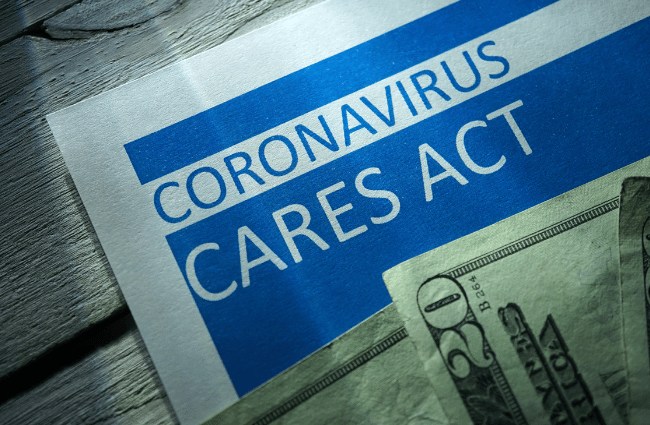The widespread economic uncertainty caused by the coronavirus (COVID-19) pandemic has taken a crippling toll on national and local economies alike. As businesses and employers around the country wrestle with the fallout of closures, layoffs and furloughs the Coronavirus Aid, Relief and Economic Security Act, better known as the CARES Act, was signed into law on March 27th, 2020 to provide some economic relief.
The entire bill contains 880 pages, and $2 Trillion in economic stimulus activities dealing with many financial issues including business funding, qualified distributions, loans, tax relief, and retirement planning. We address three of the more salient features of the CARES Act that impact our financial planning efforts with our clients.
Waiver of Required Minimum Distributions for 2020
The rapid and sharp decline in equity market prices in February and March signified the end of the longest bull market in US market history. Before the CARES Act was approved, Americans over the age of 70 ½ faced a second hit to their investment portfolios: annual Required Minimum Distributions. The CARES Act waives Required Minimum Distributions for 2020, saving investors from having to liquidate investments at depressed valuations on the heels of a significant market downturn.
Now owners of traditional IRAs and participants in qualified retirement plans like 401(k)s, 403(b)s and SIMPLE IRAs, aged 70 ½ and older, will be able to skip their Required Minimum Distributions (RMDs) in 2020. This waiver also includes owners of Inherited IRA accounts of any age.
The RMD for 2020 will not be added to future years, but account owners and participants will be required to resume RMDs in 2021 based on the value of their IRAs and retirement plans on December 31st, 2020. Account holders and participants who have already taken Required Minimum Distributions for 2020 may have the option to reverse their distribution and return the money to an IRA account.
Coronavirus-Related Distributions for 2020
For some retirement plan participants who are struggling financially because of the coronavirus pandemic, relaxed rules on distributions from vested retirement plan account balances may provide some needed financial relief.
In order to qualify for the relaxed distribution rules the plan participant must be diagnosed with a coronavirus illness, have a spouse or dependent that is diagnosed with a coronavirus illness or experience “adverse financial consequences” due to the coronavirus pandemic. This relief is offered through December 31, 2020.
The new distribution rules include:
- Distribution limits of $100,000 aggregated across all plans of the employer.
- Waiver of the 10% early withdrawal penalty for distributions before age 59 ½.
- Waiver of the 20% mandatory tax withholding required at distribution.
- Distributions can be rolled into an IRA or employer plan within three years of the distribution date. Any distribution amount not rolled into an IRA or employer Plan within the three-year time limit will be included in gross taxable income. The participant may elect to include the taxable income over thee tax years instead of one year, however.
401(k) Loan Relief Related to the Coronavirus
Two types of relief pertaining to 401(k) loans were included in the CARES Act for plan participants impacted by the coronavirus through December 31, 2020.
- The first relief effort allows eligible 401(k) plan participants to take loans equal to the lesser of $100,000 or 100% of the participant’s vested account balance. Under normal conditions, 401(k) loan limits are equal to the lesser of $50,000 or 50% of the participant’s vested account balance.
- The second part of the relief effort allows participants to request a suspension of loan repayments due on outstanding 401(K) loans for a period of up to twelve months. Under normal conditions, 401(k) loan repayments begin shortly after the loan origination and repayments typically last for five years.
There are many other provisions in the CARES Act that address other financial and health matters. Please reach out to the financial planners of Bollin Wealth Management to discuss the CARES Act and how it may be able to help you through this challenging time.
Sources: The Wall Street Journal, www.congress.gov, www.taxfoundation.org

